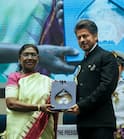Why Is Modern Woman Being Stereotyped: Vidya Balan Talks About 'Sherni' And Feminists Being Traditional
Vidya Balan asked why the modern woman is being "stereotyped" while speaking at the book's launch ceremony.

New Delhi: Vidya Balan has questioned why contemporary feminism confines women to a conventional vision and berates them if they want to enjoy "traditional things." Vidya asked why the modern woman is being "stereotyped" while speaking at the book's launch ceremony for film critic Maithili Rao.
Vidya also mentioned her 2021 film 'Sherni'. In the Amit Masurkar-directed drama, Vidya played a moral forest ranger tasked with resolving a man-animal conflict. Sharat Saxena, Vijay Raaz, Ila Arun, Brijendra Kala, Neeraj Kabi, and Mukul Chaddha also appear in the movie.
"Why can't a strong woman, a feminist, have a partner, also wish to enjoy traditional things and also wish to take a step back? Why is the modern woman being used as a typical example of what every woman must be? Why is the modern woman being stereotyped? Why empowerment and wanting to live as you please needs to be so exclusive," Vidya said, as quoted by the news agency PTI.
She talked about the role of Vidya Vincent that she played in 'Sherni'.
"That's why I loved Sherni so much. She took on these men, but in such a subdued manner, not needing to indulge in any chest-thumping. Why do we need to pigeonhole women in a certain way we wish to see them as empowered? Why can't women just be the way they wish rather than how we wish to see them in a modern feminist outlook?" Vidya added.
Vidya was questioned if ending the discussion on women's empowerment would signify that society had reached equality during the question-and-answer session. That will "take a very long time," the actor remarked.
Vidya most recently appeared in Suresh Triveni's thriller Jalsa (2022). It is produced by Abundantia Entertainment and T-Series. Shefali Shah is featured in the film as well. A prominent journalist (Vidya) and her cook were at odds in Jalsa's engrossing story (Shefali).
Related Video
Salman Khan Birthday: Salman Khan Celebrates 60th Birthday in Grand Style at Panvel Farmhouse





































